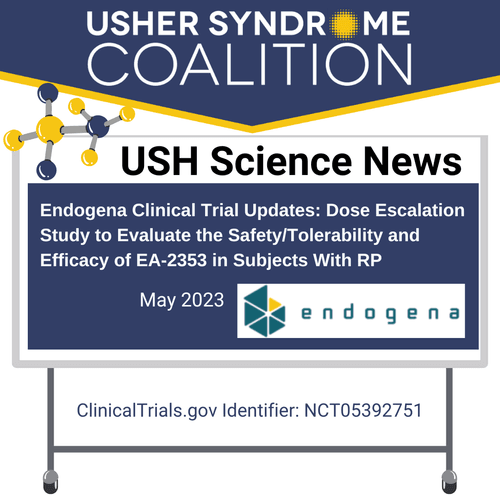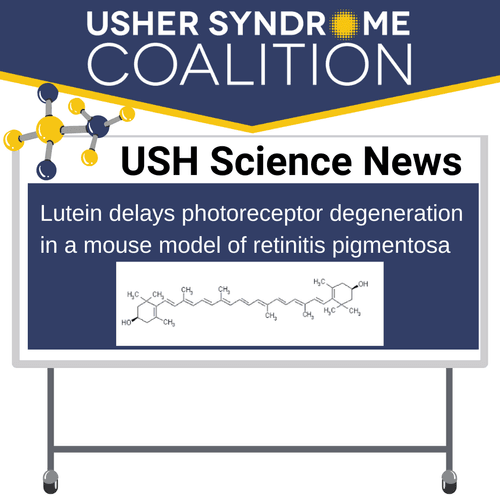Grounded in Science
A balance of research news and well-being for the Usher syndrome community.
On April 26 and 27, the Usher Syndrome Coalition brought together 22 USH Champions on Capitol Hill to advocate for increased federal funding for Usher syndrome research. We met with the offices of 30+ Members of Congress over the span of two days to discuss the urgent need to prioritize the development of treatments and a cure for Usher syndrome. While this advocacy will make a difference in the years to come, sharing personal stories about living with USH made an immediate impact on dozens of staffers and Members of Congress.
We also made the local news, thanks to Peggy Borst, a Coalition volunteer! Check out the local coverage of the Usher Syndrome Coalition’s Capitol Hill advocacy work from ABC7 WJLA with Alison Starling.
Interested in advocating for Usher syndrome research with the Coalition? Become an USH Champion.
Have you joined the Usher Syndrome Coalition Discord Community Server? It’s a safe place for the community to connect with each other.
Join here: https://discord.gg/czwHGaDu7W
Research Spotlight
Dose Escalation Study to Evaluate the Safety/Tolerability and Efficacy of EA-2353 in Subjects With Retinitis Pigmentosa (Endogena Therapeutics)
In the summer of 2022, Endogena launched its first dosing of its phase 1/2a study of EA-2353 in retinitis pigmentosa (RP). Endogena is attempting to activate stem cells in the retina with EA-2353, which takes a novel, small-molecule approach, with hopes of producing and replacing lost and damaged photoreceptors, the reason for loss of vision in Usher syndrome and retinitis pigmentosa. EA-2353 is designed to work independently of the underlying gene mutation.
Fourteen participants are enrolled in this trial, all of which will receive intravitreal injections (eye injections) in one eye. All participants show symptoms of RP and have a genetic diagnosis. This study is being conducted in collaboration with Endogena’s Lead Investigator, Mark Pennesi, MD, PhD, Professor of Ophthalmology at the Casey Eye Institute in Oregon.
On February 6, 2023, the investigation of EA-2353 for the treatment of RP received U.S. FDA Fast Track designation. On April 5, 2023, Endogena announced that the dose-escalation stage of the phase 1/2a study has been successfully completed. No clinically relevant or dose-limiting adverse events were identified after repeated intravitreal injections. After the approach has been shown to be safe and tolerable with various doses, the study enrolls patients into the expansion cohort, using the highest dose evaluated to examine how effective this drug therapy could be for patients with RP.
On May 4, 2023, Endogena announced it had completed patient enrollment ahead of schedule in its Phase 1/2a trial of EA-2353 for the treatment of retinitis pigmentosa (RP). With the dose-escalation stage completed, the ongoing trial is now in the expansion cohort stage.
What this means for Usher syndrome: EA-2353 could be a game changer for all RP patients, not just ones with Usher syndrome. Activated stem cells may enable regeneration of photoreceptors and potentially reinstate light-detection capabilities. In addition, the Fast Track designation gives hope to the community that this treatment could be viable sooner rather than later.
DISCLAIMER: The Usher Syndrome Coalition does not provide medical advice nor promote treatment methods. USH Science News is intended to help summarize more complex literature for the community to use at their own discretion.
For more, check out our Current USH Research page specific to USH subtype as well as gene-independent therapeutic approaches.
In Case You Missed It: Science News Feature
Lutein delays photoreceptor degeneration in a mouse model of retinitis pigmentosa
Lutein is a dietary carotenoid found in the eye with reported anti-oxidant properties. This study tested the effect of oral lutein when given to mice with retinitis pigmentosa caused by a mutation in the Pde6b gene. They found that mice who received lutein appeared to have slowed photoreceptor degeneration compared to those who did not receive treatment. They hypothesize that a likely mechanism of action is that lutein has an anti-oxidative effect in the retina which weakens the immune response to the dying photoreceptor cells.
What this means for Usher syndrome: While other potential RP treatments are invasive and often require surgery or injections, lutein is an over-the-counter anti-oxidant that is non-invasive and can be consumed orally. These results further support the promotion of a simple pill that may help slow down retinal degeneration enabling the affected individuals to maintain and enjoy a higher quality of life for longer.
For more science news, check out our Science News page, organized by treatment approach and type of Usher syndrome.
On Well-Being: Community
The Usher Syndrome Coalition is a hub for connecting the global Usher community; but what does “community” mean to you? Community is generally defined as: “a group of people with diverse characteristics who are linked by social ties, share common perspectives, and engage in joint action in geographical locations or settings"...
USH Life Hack of the Month
(Send your USH life hacks to info@usher-syndrome.org.)
Planning any air travel in the coming months? Allow for more time to find and get through security and to your departure gate. You can inquire about wheelchair assistance and/or priority boarding at the ticket counter. Upon reaching the boarding gate, communicate to the agent that you’ll need help hearing when they start priority boarding. Wheelchair assistance is nice because it can be very intimidating to navigate airports, especially with poor lighting, long security lines, and overwhelming loud noises.









